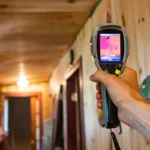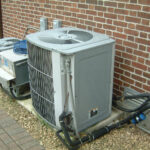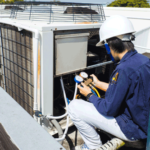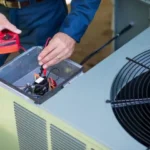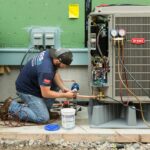Just as seasons change, so can your HVAC system’s lifespan. You’re probably wondering, ‘How long does it take to replace an HVAC system?’ Well, you’re in the right place!
This guide will walk you through the factors influencing replacement time, typical timelines, preparations, and potential delays. You’ll be well-equipped to handle your HVAC installation and replacement like a pro.
Let’s dive in and demystify the process together!
Understanding HVAC System Replacement
You’ll need a solid grasp of the components and process of an HVAC system replacement to estimate the time it’ll take accurately.
Replacement costs vary depending on the system types involved. Central systems, for instance, are more complex and, hence, more expensive to replace than ductless mini-splits.
Understanding the underlying components, from thermostats to air handlers, is vital. A high-efficiency system may have a higher upfront cost, but it’ll save you money in the long run due to reduced energy usage.
The replacement process involves the removal of the old system, new HVAC installation, and system testing. This isn’t a DIY job; you’ll need a Certified HVAC Contractor.
Knowledge of these factors will help you make informed decisions.
Factors Influencing Replacement Timeline
While it’s hard to pinpoint an exact time frame, several factors can influence how long it takes to replace your HVAC system. The complexity of your system significantly impacts the timeline. A simple system might take a few hours, while a complex one could take several days.
Another key factor is technician availability. If a certified HVAC contractor isn’t immediately available, you’ll have to wait.
Cost analysis also plays a crucial role. You’ll need to compare the cost of repairing your current system to the cost of a new one. This can take time, especially if you’re seeking multiple quotes.
Lastly, unforeseen issues can arise during replacement, such as the need for additional ductwork or electrical upgrades, further extending the timeline. Don’t underestimate the importance of these factors when planning your HVAC replacement.
Read More: How Hard Is It to Install a HVAC Unit?
Typical Timeline for HVAC Replacement
On average, it takes about one to three days to replace your HVAC system, but remember, this timeline can vary based on the factors we’ve discussed.
Here’s a general outline of what you can expect:
- Day One: Your old system is disconnected and removed, and the new one arrives.
- Removal of the old system
- Arrival and inspection of your new system
- Day Two: Your new HVAC installation, which includes connecting it to your ductwork and thermostat.
- Installation and connection of the new system
- Day Three: Testing and fine-tuning to ensure energy efficiency and optimal performance.
- System testing and adjustments
Preparing for HVAC System Replacement
Before diving into the process of replacing your HVAC system, it’s essential to get your home and the system are ready for the upcoming work. Research replacement options thoroughly, considering factors like energy efficiency, size, and brand. When evaluating cost estimation, factor in not only the price of the system itself but also installation and potential future maintenance costs.
Clear the area around your current HVAC system to provide easy access for the technicians. Consider any changes to your home that may affect the type of system you need, like new insulation or windows. Understanding these factors thoroughly will ensure a smoother replacement process and help you make a well-informed decision.
Potential Delays in HVAC Replacement
In the process of replacing your HVAC system, you might encounter some unexpected delays that could extend the timeline. Unforeseen complications can easily arise, causing setbacks. Weather impact often plays a crucial role as well, with adverse conditions delaying the installation process.
Here are some potential issues you could face:
- Unforeseen complications
- Discovering additional problems with your existing system requires extra repairs.
- Difficulty in sourcing specific parts or models, which might lead to delays.
- Weather impact
- Severe weather conditions such as heavy rain, snow, or extreme heat can halt work.
- Even moderately windy or rainy days can slow down the installation process.
Having a clear understanding of these potential delays will keep you prepared and help you manage your expectations effectively.
Conclusion
Replacing your HVAC system doesn’t have to be a hassle. While the process generally takes a day or two, some factors could extend this timeline. But don’t let the fear of a few potential delays deter you.
Remember, a new HVAC system will offer you improved comfort, energy efficiency, and lower utility bills. So, gear up for this short-term inconvenience for long-term benefits.
Trust the experts at Menlopark HVAC, and you’ll soon be enjoying a more comfortable home environment. Call us Today !!

